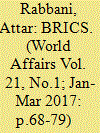|
|
|
Sort Order |
|
|
|
Items / Page
|
|
|
|
|
|
|
| Srl | Item |
| 1 |
ID:
152425


|
|
|
|
|
| Summary/Abstract |
Challenging projections about the growth and influence of BRICS, Attar Rabbani argues that instead of rivalling the G-7, BRICS could become a distant memory if growth figures decline within member nations. Geopolitics, entrenched structural complexities together with confliting interests would pull apart the constituent units of the conclave sooner rather than later.
|
|
|
|
|
|
|
|
|
|
|
|
|
|
|
|
| 2 |
ID:
169665


|
|
|
|
|
| Summary/Abstract |
The South China Sea is poised to be the next big geopolitical theatre. It is one of the busiest and most important maritime routes for global trade, commerce and energy supply. The freedom of navigation is therefore at the centre of attention. The sea is dotted by many atolls, cays, islands, reefs, sandbars and shoals, so situated that all littoral countries claim the region as their own. This paper reviews the claims and counterclaims to the area, assesses the energy reserves that allegedly sit beneath it and analyses its significance as a maritime crossroads. The main argument of the paper is that, although the South China Sea is important from the point of view of trade, fi shing and energy reserves, China's strategic concerns trump them all.
|
|
|
|
|
|
|
|
|
|
|
|
|
|
|
|
| 3 |
ID:
182151


|
|
|
|
|
| Summary/Abstract |
The evolving nuclear-weapons order in South Asia is striking. The region’s nuclear weapon states – India and Pakistan – have, since the start of the twenty-first century, been following respectively the rival ‘credible minimum deterrence’ and ‘full spectrum’ pathways to secure strategic stability. The diametrically opposite or rival postures, however, widen the spectre of a nuclear-flash and increase the plausibility of a holocaust.
In fact, they call into question the true intention of the parties and cast a shadow of doubt over the pledge to use nuclear weapons as ‘the instrument of last resort’. Attar Rabbani deciphers India’s ‘credible minimum deterrence’; disentangles Pakistan’s ‘full spectrum’ and examines the resultant consequences. It argues that the rival deterrent postures are the result of mutually reinforcing elements present in the respective nuclear paradigms.
|
|
|
|
|
|
|
|
|
|
|
|
|
|
|
|
| 4 |
ID:
127683


|
|
|
|
|
| Publication |
2011.
|
| Summary/Abstract |
The Armed Forces (Jammu & Kashmir) Special Powers Act (AFSPA) has been in force since the last two decades without a lull in between. More than anything else, it has facilitated violations of human rights on account of several of its draconian provisions. Though originally meant for a limited period, AFSPA has become a permanent feature now. The reports of torture, custodial killings, rapes, forced disappearances, fake encounters continuously pour from the state. Moreover, there is a virtual military rule in the state with 500,000 armed troops (300,000 army troops, 70,000 Rashtriya Rifle soldiers, 130,000 central police forces) to control the people and over 100,000 civilian intelligence and surveillance operatives to monitor them. The AFSPA has emboldened these forces to use excessive force to suppress popular aspiration in order to maintain 'calm' which has resulted in the death of thousands of innocent people. This article argues that this situation is untenable in view of the oft-claimed democratic credentials of India and hence argues for AFSPA's annulment.
|
|
|
|
|
|
|
|
|
|
|
|
|
|
|
|
| 5 |
ID:
156811


|
|
|
|
|
| Summary/Abstract |
Attar Rabbani examines nuclear deterrence in theory as well as in practice during and after the end of the Cold War. His central argument is that technological revolutions pose a serious challenge to the survivability of retaliatory arsenals—the heart of nuclear deterrence—and propel a new arms race among nuclear elites, both recognised and self-declared.
|
|
|
|
|
|
|
|
|
|
|
|
|
|
|
|
|
|
|
|
|